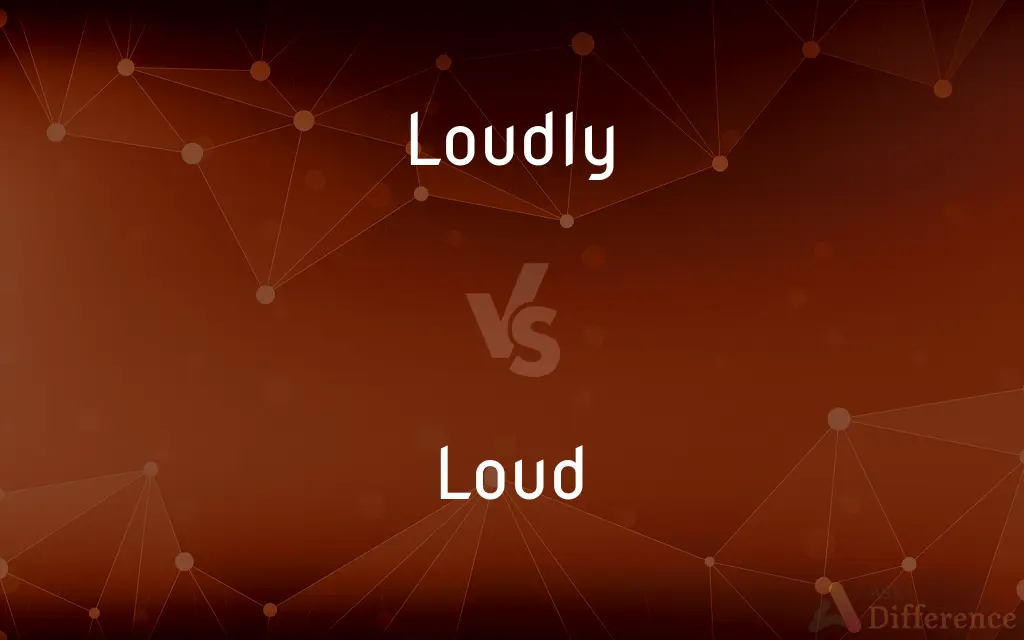Loudly vs. Loud — What's the Difference?
By Maham Liaqat & Urooj Arif — Updated on April 1, 2024
"Loudly" is an adverb describing the manner in which a sound is made with high volume, while "loud" is an adjective describing a sound of high volume.

Difference Between Loudly and Loud
Table of Contents
ADVERTISEMENT
Key Differences
Loudly is used to modify verbs, indicating that an action is performed with a high volume or intensity. For example, speaking loudly means the act of speaking is done with a strong, powerful voice. On the other hand, loud as an adjective directly describes nouns, such as a loud noise, indicating that the noise itself is of high volume. This distinction highlights the grammatical roles each word plays in a sentence.
When someone says they heard music playing loudly, they're focusing on how the music was being played, emphasizing the manner of the music's delivery. Whereas, describing music as loud focuses on the characteristic of the music itself, regardless of how it's being played. This difference underlines the subjective experience versus the inherent quality of sound.
Using loudly can also imply intention or effort, as in laughing loudly at a joke, suggesting a deliberate action or reaction. Loud, however, simply describes the sound's intensity level, like a loud alarm, which might not involve human intention. This nuance can suggest different contexts or perceptions around the sound or action being described.
In expressions of emotion or reaction, saying someone cried loudly conveys a vivid picture of the intensity of the crying, potentially indicating the emotional depth or the situation's impact. Meanwhile, a loud cry might be used to describe the cry's volume itself, without necessarily implying the same depth of context or reaction. This distinction can affect the imagery or emotional response elicited by each description.
In literature or writing, using loudly can add dynamic action to a narrative, giving life to scenes and character interactions. Loud, while descriptive, may not convey the same level of action or energy, instead offering a static description of a scene or object’s auditory characteristics, showcasing how choice of words influences narrative tone and pacing.
ADVERTISEMENT
Comparison Chart
Part of Speech
Adverb
Adjective
Function
Describes how an action is performed
Describes the quality of a sound
Implication
May suggest intention or effort
Indicates intensity level without implying intention
Usage in Writing
Adds action or energy to narratives
Offers static description of auditory characteristics
Example Usage
"She laughed loudly at the joke."
"The music at the party was loud."
Compare with Definitions
Loudly
Emphatically or insistently.
They argued loudly, drawing attention from bystanders.
Loud
Producing or capable of producing a large amount of noise.
The loud sirens could be heard blocks away.
Loudly
In a way that produces a lot of noise.
The crowd cheered loudly when the goal was scored.
Loud
Emphatic or insistent in expression.
He made his objections loud and clear.
Loudly
With a high volume.
He spoke loudly to be heard over the din.
Loud
Having a high volume.
She prefers loud music when working out.
Loudly
Noticeably or conspicuously.
Fashion trends were loudly celebrated at the event.
Loud
Strikingly vivid or conspicuous.
The shirt he wore was a loud shade of pink.
Loudly
With marked intensity or vividness.
The colors in the painting stood out loudly against the muted background.
Loud
Noticeable or hard to ignore.
The loud flavor of the spices dominated the dish.
Loudly
Characterized by high volume and intensity. Used of sound
A loud whistle.
Loud
Producing or capable of producing much noise
They were kept awake by loud music
His voice is loud and challenging
Loudly
Producing sound of high volume and intensity
A loud construction work site.
Loud
With a great deal of volume
They shouted as loud as they could
Loudly
Clamorous and insistent
Loud denials.
Loud
Characterized by high volume and intensity. Used of sound
A loud whistle.
Loudly
Having strikingly bright colors
A loud necktie. See garish.
Loud
Producing sound of high volume and intensity
A loud construction work site.
Loudly
Having a very strong or overpowering odor.
Loud
Clamorous and insistent
Loud denials.
Loudly
In a loud manner.
Loud
Having strikingly bright colors
A loud necktie. See garish.
Loudly
In a loud manner; at a high volume.
He spoke loudly so that his brother could hear him from across the street.
Loud
Having a very strong or overpowering odor.
Loudly
In a loud manner.
Loud
In a loud manner.
Loudly
With relatively high volume;
The band played loudly
She spoke loudly and angrily
He spoke loud enough for those at the back of the room to hear him
Cried aloud for help
Loud
(of a sound) Of great intensity.
Turn that music down; it's too loud.
What was that? It sounded like a really loud sneeze.
Loudly
In manner that attracts attention;
Obstreperously, he demanded to get service
Loud
(of a person, thing, event, etc.) Noisy.
A loud party that went on all night
Loudly
Used as a direction in music; to be played relatively loudly
Loud
(of a person, event, etc.) Not subtle or reserved, brash.
Loud
(of clothing, decorations, etc.) Having unpleasantly and tastelessly contrasting colours or patterns; gaudy.
A loud style of dress;
Loud colors
Loud
High-quality; premium; (by extension) having a strong or pungent odour indicating good quality.
Loud
(colloquial) A loud sound or part of a sound.
Loud
High-quality marijuana.
Loud
Loudly.
Loud
Having, making, or being a strong or great sound; noisy; striking the ear with great force; as, a loud cry; loud thunder.
They were instant with loud voices, requiring that he might be crucified.
Loud
Clamorous; boisterous.
She is loud and stubborn.
Loud
Emphatic; impressive; urgent; as, a loud call for united effort.
Loud
Ostentatious; likely to attract attention; gaudy; as, a loud style of dress; loud colors.
Loud
With loudness; loudly.
To speak loud in public assemblies.
Loud
Characterized by or producing sound of great volume or intensity;
A group of loud children
Loud thunder
Her voice was too loud
Loud trombones
Loud
Tastelessly showy;
A flash car
A flashy ring
Garish colors
A gaudy costume
Loud sport shirts
A meretricious yet stylish book
Tawdry ornaments
Loud
Used chiefly as a direction or description in music;
The forte passages in the composition
Loud
With relatively high volume;
The band played loudly
She spoke loudly and angrily
He spoke loud enough for those at the back of the room to hear him
Cried aloud for help
Common Curiosities
Is it grammatically correct to use loudly as an adjective?
No, loudly is an adverb and should not be used as an adjective. The correct adjective form is "loud."
How can the intensity of a sound be described both loudly and as loud?
The intensity can be described as loud for the sound's characteristic, and loudly can be used to describe how the sound is made or heard.
What is the difference between speaking loudly and loud speaking?
Speaking loudly focuses on the manner of speaking with high volume, while loud speaking describes the act of speaking as having a high volume.
Is loudly ever used in a non-auditory sense?
Rarely, it could be used metaphorically to describe actions that are vivid or emphatic, but its primary use relates to sound.
Can music be described as playing loudly and loud?
Yes, music playing loudly emphasizes how the music is being played, whereas describing music as loud focuses on the music's volume level.
Can the term loud be used to describe tastes or colors?
Yes, loud can describe tastes or colors, suggesting they are strikingly vivid or hard to ignore, unlike loudly, which pertains to sound.
What does it mean for clothes to be loud?
Clothes described as loud are strikingly vivid or conspicuous in color or pattern, drawing attention.
Can loud noises always be heard loudly?
Yes, loud noises are typically heard loudly due to their high volume, but how loudly one hears can depend on the listener's distance or surroundings.
Can a person be described as loud?
Yes, describing a person as loud often refers to their tendency to speak with a high volume or to have a conspicuous presence.
Does loudly imply a negative connotation?
Not inherently, but it can suggest annoyance or disruptiveness depending on the context.
Is laughing loudly different from a loud laugh?
Laughing loudly emphasizes the action of laughing with high volume, whereas a loud laugh focuses on the volume of the laugh itself.
How does one write dialogues loudly in literature?
In literature, dialogues can be described as spoken loudly by using adverbs or by indicating the volume through context or character actions.
How do loud and loudly interact in musical settings?
Loud describes the music’s volume level, while loudly can describe how musicians play their instruments or how listeners perceive the music.
Can the environment be loud or only be perceived loudly?
The environment can be described as loud based on its overall noise level, and sounds within it can be perceived loudly based on their intensity and the listener's perception.
Is it possible to speak softly and loudly at the same time?
Speaking softly and loudly are contradictory in terms of volume, so they cannot be done simultaneously in the literal sense.
Share Your Discovery

Previous Comparison
Peg vs. Clip
Next Comparison
Real vs. StagedAuthor Spotlight
Written by
Maham LiaqatCo-written by
Urooj ArifUrooj is a skilled content writer at Ask Difference, known for her exceptional ability to simplify complex topics into engaging and informative content. With a passion for research and a flair for clear, concise writing, she consistently delivers articles that resonate with our diverse audience.
















































